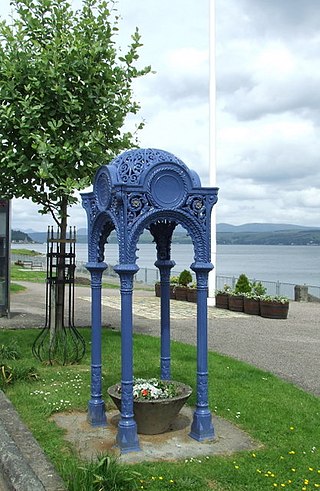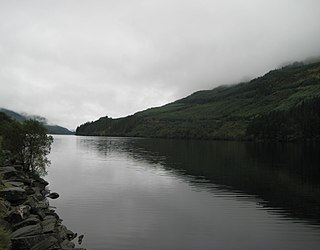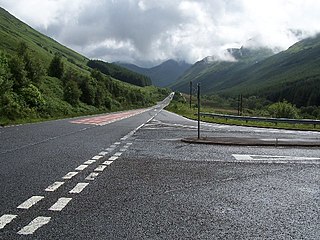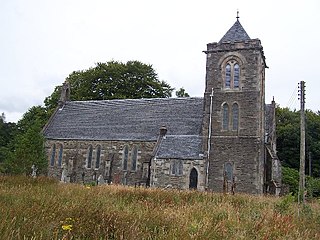Related Research Articles

The Firth of Clyde is the mouth of the River Clyde. It is located on the west coast of Scotland and constitutes the deepest coastal waters in the British Isles. The firth is sheltered from the Atlantic Ocean by the Kintyre peninsula, which encloses the outer firth in Argyll and Ayrshire. The Kilbrannan Sound is a large arm of the Firth of Clyde, separating the Kintyre Peninsula from the Isle of Arran. Within the Firth of Clyde is another major island – the Isle of Bute. Given its strategic location at the entrance to the middle and upper Clyde, Bute played a vital naval military role during World War II.

Dunoon is the main town on the Cowal peninsula in the south of Argyll and Bute, Scotland. It is located on the western shore of the upper Firth of Clyde, to the south of the Holy Loch and to the north of Innellan. As well as forming part of the council area of Argyll and Bute, Dunoon also has its own community council. Dunoon was a burgh until 1976.

Caledonian MacBrayne, usually shortened to CalMac, is the major operator of passenger and vehicle ferries, and ferry services, between the mainland of Scotland and 22 of the major islands on Scotland's west coast. Since 2006, the company's official name has been CalMac Ferries Ltd, although it still operates as Caledonian MacBrayne. In 2006, it also became a subsidiary of holding company David MacBrayne, which is owned by the Scottish Government.

Cowal is a peninsula in Argyll and Bute, in the west of Scotland, that extends into the Firth of Clyde.

The Holy Loch is a sea loch, a part of the Cowal peninsula coast of the Firth of Clyde, in Argyll and Bute, Scotland.

Loch Long is a body of water in Argyll and Bute, Scotland. The Sea Loch extends from the Firth of Clyde at its southwestern end. It measures approximately 20 miles (32 km) in length, with a width of between 1 and 2 miles. The loch also has an arm, Loch Goil, on its western side.

Kirn is a village in Argyll and Bute in the Scottish Highlands on the west shore of the Firth of Clyde on the Cowal peninsula. It now forms part of the continuous habitation between Dunoon and Hunters Quay, where the Holy Loch joins the Firth of Clyde. It originally had its own pier, with buildings designed by Harry Edward Clifford in 1895, and was a regular stop for the Clyde steamer services, bringing holidaymakers to the town, mostly from the Glasgow area.

Strachur; and Strathlachlan; are united parishes located on the Cowal peninsula, in Argyll and Bute, Scotland. Strachur is a small village on the eastern coast of Loch Fyne.

Loch Eck is a freshwater loch located on the Cowal peninsula, north of Dunoon, Argyll and Bute, Scotland. It is seven miles long. Along with Loch Lomond, it is the only naturally occurring habitat of the Powan (fish). The loch also has salmon, sea trout, brown trout and arctic charr.

The A815 is a major road in Argyll and Bute, Scotland. It runs for about 37 miles (60 km) from the A83, near Cairndow, in the north to Toward in the south. It passes beside three lochs, while its final stretch is along the Firth of Clyde.

Hunters Quay is a village, on the Cowal peninsula in Argyll and Bute, Scottish Highlands. Situated between Kirn to the south and Ardnadam to the north, Hunters Quay is the main base of Western Ferries, operating between Hunters Quay and McInroy's Point.

Dunoon Castle is a ruined castle located at Dunoon on the Cowal peninsula in Argyll and Bute, Scotland. The castle sat upon a cone-shaped hill of about 80 feet high, a volcanic plug. Very little remains of the castle's structure today. Castle House, built in 1822, stands a few yards north of the castle ruins.

Cowal Community Hospital is a community hospital in Dunoon on the Cowal peninsula, Argyll and Bute in the West of Scotland. It is managed by NHS Highland.

St John's Church, formerly Dunoon Free Church, is a Presbyterian church building in Dunoon, Argyll and Bute, Scotland. A Category A listed structure, it is located in the town centre at the junction between Hanover Street and Victoria Road. The church is still in daily use.

Dunoon Camanachd is a shinty club, from Dunoon, Scotland. The team competed from 2016 to 2017 in South Division Two but its senior side went into abeyance in 2018.

Helen Crawfurd was a Scottish suffragette, rent strike organiser, Communist activist and politician. Born in Glasgow, she was brought up there and in London.

Mackintosh MacKay was a Scottish minister and author who served as Moderator of the General Assembly of the Free Church of Scotland in 1849. He edited the Highland Society's prodigious Gaelic dictionary in 1828.

Holy Trinity Church is an Episcopalian church building in Dunoon, Argyll and Bute, Scotland. It is located on Kilbride Road, southwest of the town centre. Constructed in the Gothic revival style, it is a Category B listed building.

William Fraser, RIBA was a Scottish-born architect, prominent in the late 19th and early 20th centuries, who initially practised in Great Britain and then in Canada until his death in 1922.

Dunoon Pier is a Victorian pier in the Scottish town of Dunoon, Argyll and Bute. Completed in its current form in 1898, and reaching out into the Firth of Clyde, its earliest parts date back to 1835. It is now a Category A listed structure and, according to Historic Environment Scotland, the best surviving example of a timber ferry pier in Scotland.
References
- ↑ Farmer, Henry George (1947). A History of Music in Scotland. Hinrichsen Edition. p. 402.
- ↑ Walker, Frank Arneil (2000). Argyll and Bute, Volume 7. Penguin. p. 230. ISBN 9780140710793.